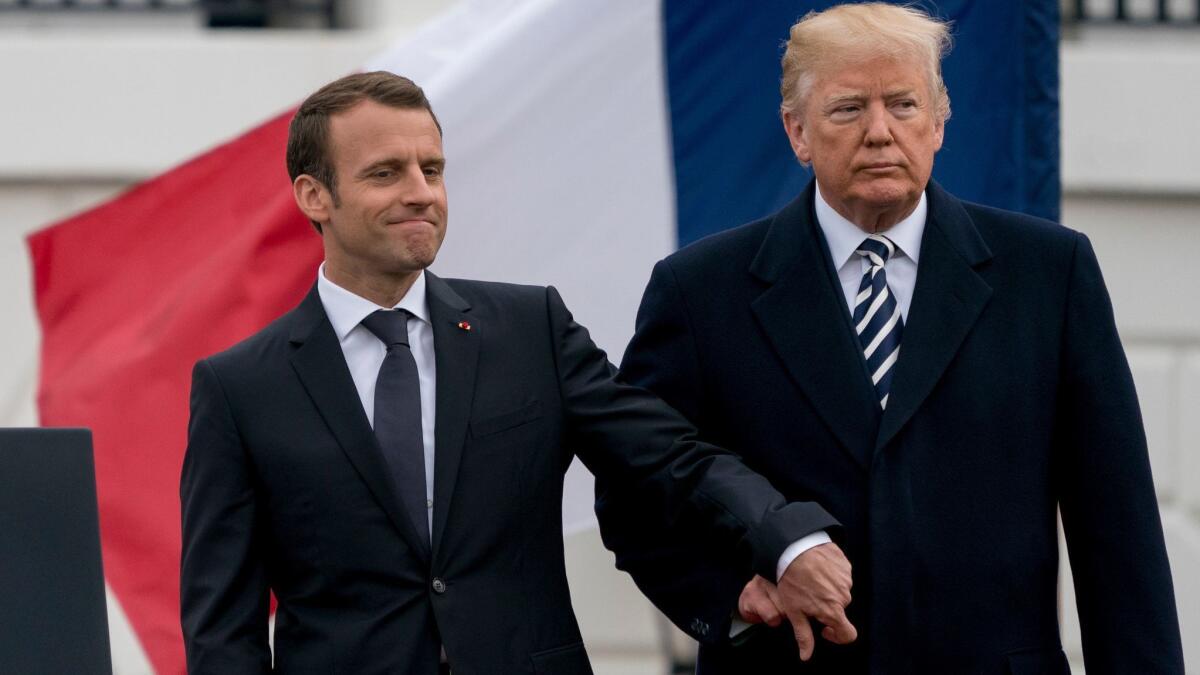Trump and Macron said to reach tariff truce over digital tax fight

President Trump and French President Emmanuel Macron agreed to a truce in their dispute over digital taxes that will mean neither France nor the U.S. will impose punitive tariffs this year, a French diplomat said.
- Share via
President Trump and French President Emmanuel Macron agreed to a truce in their dispute over digital taxes that will mean neither France nor the U.S. will impose punitive tariffs this year, a French diplomat said.
“Great discussion with @realDonaldTrump on digital tax,” Macron said Monday in a tweet. “We will work together on a good agreement to avoid tariff escalation.”
The respite defuses for now transatlantic tensions that had been building between Washington and Brussels along another potential trade war front. Last week, Trump signed a cease-fire with China in phase one of a broader deal aimed at balancing trade between the world’s two largest economies.
The European Union is an even bigger U.S. trading partner than China and supply chains between the two economies, particularly in automotive and financial services industries, are intertwined in ways that would make a tit-for-tat tariff dispute even more harmful to the world economy.
France and the U.S. will continue negotiations along with their European partners until the end of 2020 to agree a global framework that ensures tech companies pay an appropriate amount of tax, the French diplomat said.
Macron’s government still hopes to find a solution that fits within discussions at the Organization for Economic Cooperation and Development’s work on the issue, the official added, asking not to be identified in line with French government rules.
The White House and the U.S. Trade Representative’s office didn’t immediately respond to requests for comment.
European finance ministers meeting in Brussels Tuesday will discuss progress of the OECD talks. While the OECD is still working on its proposal for taxing tech companies around the world, France pushed ahead with its own levy last year that hit U.S. internet giants such as Google, Apple Inc. and Amazon.com Inc.
The U.S. objected, alleging on Dec. 2 that the French tax discriminates against American technology companies, citing Section 301 of a 1974 American law that Trump has thus far reserved to justify tariffs against China. That opened the door to the U.S.’s threat to hit $2.4 billion of French goods with tariffs in retaliation.
Among the French products targeted with duties of as much as 100% were luxury items such as wine, cheese and makeup. One American wine merchant called it the biggest threat to the industry since Prohibition a century ago.
For its part, the French government had warned that the EU would retaliate if the U.S. imposed additional tariffs.
The dispute was another headache for European trade officials scrambling to expand their policy arsenal as the U.S. takes aim at a rules-based system for global trade that Trump argues is outdated and tilted against America. It also coincided with a change in leadership at the European Commission, the EU’s executive arm.
EU trade commissioner Phil Hogan visited Washington last week for the first time in the job, partly to plead for talks rather than tariffs in disagreements such as the French digital tax. At stake, he said, was transatlantic trade in goods and services valued at more than $3 billion a day.
“Sounds like a fairly healthy relationship to me,” Hogan said Thursday in the U.S. capital. “So why put tariffs on these EU products to make them more expensive for your people?”
The truce follows weeks of discussions between Treasury Secretary Steven T. Mnuchin and French Finance Minister Bruno Le Maire, who were scheduled to meet Wednesday in Davos, Switzerland, the alpine resort town where government officials and business leaders gather during the winter to discuss whatever is ailing the global economy.
U.S. and EU trade relations started to sour in 2018 when the Trump administration invoked national-security considerations to impose tariffs on steel and aluminum from Europe. As a U.S. military ally, the EU was infuriated and promptly retaliated with levies on iconic American brands such as Harley-Davidson Inc. motorcycles and Levi Strauss & Co. jeans.
A subsequent U.S. threat to wreak significantly more economic damage by targeting the European auto industry with duties on the same security grounds led to a hastily agreed truce and a pledge by both sides to work toward reducing industrial tariffs across the board.
Since then, the Trump administration has refused to start the tariff-cutting negotiations unless Europe includes agriculture in them. Also, it imposed levies on EU products in retaliation over government aid to Airbus SE that was deemed illegal by the World Trade Organization, and disabled the WTO’s appellate body,
The EU, meanwhile, is pressing ahead with a plan for tariffs against the U.S. in a parallel WTO case over unlawful subsidies to Boeing Co.
Trump, scheduled to speak Tuesday in Davos at the World Economic Forum’s annual meeting, on Sunday reiterated his frustration with Europe as a trading partner.
“Europe has had tremendous barriers to us doing business with them. All those barriers are coming down. They have to come down,” he told a conference of farmers in Austin, Texas. “If they don’t come down, we’re going to have to do things that are very bad for them.”
He added, “Europe was, in many ways, more difficult — and is more difficult — than China.”
More to Read
Inside the business of entertainment
The Wide Shot brings you news, analysis and insights on everything from streaming wars to production — and what it all means for the future.
You may occasionally receive promotional content from the Los Angeles Times.










